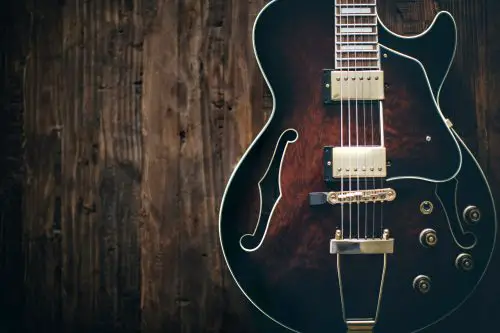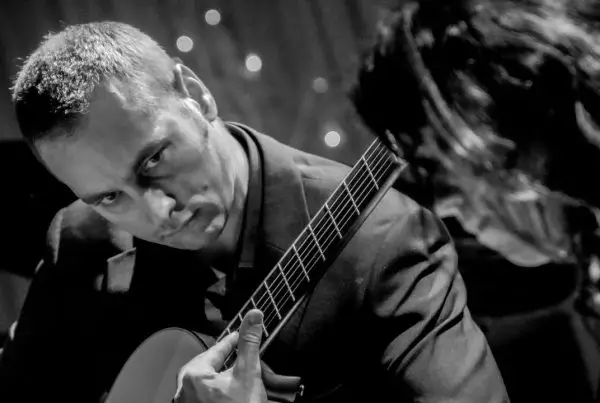Is it ever too late to learn jazz guitar?
It is never too late to learn jazz guitar. While it is true that starting at a young age can have its advantages, such as increased flexibility and adaptability, age should not be a limiting factor when it comes to learning jazz guitar. With determination and practice, anyone can learn to play jazz guitar at any stage in life.
Learning jazz guitar requires time and dedication, regardless of age. It is important to have a passion for the music and a desire to learn and improve. While younger individuals may have more time and energy to devote to practice, adults can make use of their life experiences and maturity to enhance their learning process.
One benefit of learning jazz guitar later in life is that adults often have a more developed sense of musicality and a better understanding of theory. This can accelerate the learning process and enable them to grasp complex concepts more easily. Additionally, adults may have access to more resources and guidance, such as private lessons or online tutorials, which can aid in their progress.
It is also important to note that learning jazz guitar is a lifelong journey. Even seasoned musicians continue to learn and grow throughout their lives. There is no end point or age limit when it comes to mastering jazz guitar. As long as an individual is willing to put in the effort and practice regularly, they can continue to improve and enjoy playing jazz guitar for many years.
Here’s a summary that sums up the entire article if you are too busy. Otherwise, read till the end because there are much more to the topic!
| Subheader | Summary |
|---|---|
| Is it too late to learn jazz guitar? | It is never too late to learn jazz guitar. With determination and practice, anyone can learn to play jazz guitar at any stage in life. |
| How long does it take to learn jazz guitar? | The time to learn jazz guitar varies, but it is a lifelong journey. Beginners can establish a basic proficiency in several months to a year, but learning and improving continue throughout the guitarist’s life. |
| Is it difficult to learn jazz guitar? | Learning jazz guitar can present challenges, but with dedication and practice, it is an achievable and rewarding endeavor. |
| Can a beginner guitarist learn jazz? | A beginner guitarist can absolutely learn jazz. Starting with a strong foundation, listening to jazz recordings, and seeking guidance can help beginners embark on their jazz guitar journey. |
| What are some tips for learning jazz guitar? | Some essential tips for learning jazz guitar include starting with the basics, studying jazz theory, listening to jazz recordings, transcribing solos, and playing with others. |
| What are the essential jazz guitar techniques to learn? | The essential techniques to learn for jazz guitar include chord comping, single-note playing, improvisation, fingerstyle technique, rhythmic and comping patterns, altered chords and extensions, and fingerboard knowledge. |
| How can I improve my jazz guitar improvisation? | Improving jazz guitar improvisation involves learning jazz standards, practicing scales and arpeggios, focusing on rhythm, studying jazz language, internalizing melodic patterns, experimenting with scales and modes, playing with others, and recording and analyzing your improvisations. |
Also Read: Rating Popular Guitars To Play Jazz (Ft. Tele, Strat, Les Paul)
Is it difficult to learn jazz guitar?
Learning jazz guitar can present its challenges, but with dedication and practice, it is an achievable and rewarding endeavor. Like any musical instrument, the level of difficulty in learning jazz guitar will depend on the individual’s previous musical background, their knowledge of music theory, and their commitment to practice.
One of the aspects that can make jazz guitar challenging is the complexity of the music itself. Jazz is characterized by intricate harmonies, complex chord progressions, and sophisticated improvisation. Understanding and internalizing these concepts takes time and effort. However, with consistent practice, studying music theory, and listening to jazz recordings, these aspects can be mastered gradually.
Another challenge in learning jazz guitar is developing the necessary technical skills. Jazz guitarists often need to navigate through fast chords changes, intricate fingerings, and complex rhythmic patterns. Building finger strength, dexterity, and coordination can take time, but with regular practice and the guidance of a qualified teacher, these skills can be cultivated.
The ability to improvise is a fundamental aspect of jazz guitar playing, and it can initially be daunting for beginners. However, with a solid understanding of scales, arpeggios, and jazz phrasing, improvisation becomes more accessible. It is a skill that improves over time with practice, listening to jazz recordings, and studying the solos of jazz guitarists.
Also Read: 5 Hardest Music Genres For Guitar: Jazz Vs Metal Vs Classic
Can a beginner guitarist learn jazz?
Yes, a beginner guitarist can learn jazz. While jazz guitar can be challenging, it is not exclusive to experienced musicians. With the right approach and mindset, beginners can start their jazz journey and develop the necessary skills and knowledge to play this genre.
Starting as a beginner, it is essential to establish a strong foundation in guitar basics such as fretboard knowledge, proper technique, and basic music theory. Beginner guitarists can begin by learning fundamental concepts like open chords, scales, and simple melodies. From there, they can gradually progress to more advanced techniques like barre chords, chord inversions, and extended scales.
To learn jazz as a beginner, it is also important to immerse oneself in the music. This includes actively listening to jazz recordings, studying the playing styles of jazz guitarists, and familiarizing oneself with jazz standards. By listening closely to the phrasing, rhythmic nuances, and improvisation, beginners can start to develop an ear for jazz and begin incorporating these elements into their playing.
While a certain level of technical proficiency is necessary to play jazz, beginners can take small steps towards learning jazz concepts. This can involve learning basic jazz chords and voicings, understanding the essential theory behind chord progressions, and integrating simple jazz rhythms into their playing. Building a strong foundation and gradually adding more complex elements will help beginners progress in their jazz guitar journey.
In addition to self-study, beginners can greatly benefit from seeking guidance from a qualified jazz guitar teacher. A skilled teacher can provide structured lessons, offer personalized feedback, and guide beginners through the various aspects of jazz guitar playing. Their expertise can help beginners avoid common pitfalls and ensure they are on the right track in their learning process.
How long does it take to learn jazz guitar?

The amount of time it takes to learn jazz guitar can vary greatly depending on several factors, including the individual’s level of dedication, musical background, and the amount of time they can commit to practicing. Learning jazz guitar is a continuous process, and there is always more to learn and improve upon.
The time it takes to develop a basic proficiency in jazz guitar can range from several months to a year or more. During this initial phase, beginners will focus on learning chord voicings, scales, and basic jazz theory. Developing the necessary finger dexterity, coordination, and understanding of jazz phrasing and improvisation takes time and consistent practice.
After this initial learning phase, progressing further as a jazz guitarist is an ongoing journey that never truly ends. It is important to continue practicing regularly, studying new concepts and techniques, and immersing oneself in the music. Growth and improvement come with time and experience, so it is crucial to be patient and persistent.
To accelerate the learning process, students can take advantage of various resources such as private lessons, online courses, instructional books, and transcribing solos of jazz guitar legends. It is also beneficial to seek out opportunities to play with other musicians, such as joining a jazz ensemble or participating in jam sessions. This real-world experience helps to develop improvisational skills and increase musicality.
Ultimately, the time it takes to learn jazz guitar is dependent on the individual’s commitment and passion for the instrument. Regular practice and a willingness to continually learn and grow are key. It is important to enjoy the journey of learning jazz guitar rather than focusing solely on the end result.
With dedication and perseverance, anyone can become a proficient jazz guitarist and experience the joy of playing this beautiful and expressive style of music.
What are some tips for learning jazz guitar?

When it comes to learning jazz guitar, there are several tips that can help beginners in their journey. These tips can provide guidance and set them on the right path to becoming proficient jazz guitarists. Here are some essential tips for learning jazz guitar:
1. Start with the basics: Begin by learning the fundamental techniques, scales, and chords that are commonly used in jazz guitar playing. Focus on mastering proper finger positioning, strumming, and picking techniques. This foundation will serve as a solid base for more advanced concepts.
2. Study jazz theory: Gain a solid understanding of jazz theory, including chord progressions, scales, and modes. Learn how to harmonize melodies, recognize common jazz chord voicings, and understand how chords function within a progression. This knowledge will enable you to navigate through jazz tunes and improvise more effectively.
3. Listen to jazz recordings: Immerse yourself in the sounds of jazz by listening to recordings of renowned jazz guitarists and ensembles. Pay attention to their phrasing, tone, and improvisational ideas. This will help develop your ear for jazz and inspire your own playing.
4. Transcribe solos: Transcribing solos by jazz guitarists is an excellent way to develop your improvisational skills. Choose solos that resonate with you and break them down, studying the underlying scales, arpeggios, and phrasing. Transcribing helps build a vocabulary of jazz licks that can be incorporated into your own playing.
5. Practice with backing tracks: Play along with backing tracks that simulate the experience of playing with a rhythm section. This will improve your timing, groove, and overall feel when playing jazz. It also provides an opportunity to practice improvisation in a supportive musical context.
6. Play with others: Seek out opportunities to play with other musicians, whether it’s jam sessions, jazz ensembles, or online collaborations. Playing with others will help you develop your ability to communicate musically, adapt to different musical situations, and hone your improvisational skills.
7. Be patient and persistent: Learning jazz guitar is a lifelong journey, and progress takes time. Be patient with yourself and embrace the process of learning. Consistency and regular practice are key to improvement. Celebrate small victories along the way and maintain a positive attitude.
By following these tips and staying dedicated to your practice routine, you can enhance your learning experience and accelerate your progress as a jazz guitarist. Learning jazz guitar is a rewarding and fulfilling endeavor, and with perseverance, you can achieve your goals and enjoy the beauty of this captivating musical genre.
What are the essential jazz guitar techniques to learn?

There are several essential jazz guitar techniques that every aspiring jazz guitarist should focus on mastering. These techniques form the foundation of jazz guitar playing and can greatly enhance your ability to play and improvise in this genre. Here are some essential jazz guitar techniques to learn:
1. Chord comping: Mastering jazz chord voicings and comping techniques is crucial in accompanying other musicians and providing harmonically rich textures during ensemble playing. Learn various chord shapes, including shell voicings, drop 2 and drop 3 voicings, and spread voicings.
2. Single-note playing: Developing strong single-note technique is important for soloing and improvisation. Work on scales, arpeggios, and melodic patterns across the neck to build finger dexterity and improve your ability to navigate the fretboard.
3. Improvisation: Jazz guitarists need to be skilled in improvising over chord progressions. Study different improvisation approaches, such as using scales, arpeggios, and chord tones, and experiment with rhythm, phrasing, and articulation to add a personal touch to your improvisations.
4. Fingerstyle technique: Jazz guitarists commonly use fingerstyle technique to play multiple notes simultaneously and achieve a fuller sound. Practice fingerpicking patterns, hybrid picking, and thumb independence exercises to improve your fingerstyle technique.
5. Rhythmic and comping patterns: Jazz music is characterized by syncopated rhythms, swing feel, and intricate comping patterns. Develop a strong sense of time and explore various rhythm patterns and comping techniques, such as staccato chords, rhythmic strumming, and chord substitutions.
6. Altered chords and extensions: Familiarize yourself with altered chords, such as dominant 7th sharp 9 and dominant 7th flat 5 chords, which add tension and color to jazz progressions. Also, learn about chord extensions like 9th, 11th, and 13th chords to expand your harmonic vocabulary.
7. Fingerboard knowledge: Understanding the layout of the guitar fingerboard is essential for improvising and navigating chord progressions. Practice visualizing scales, intervals, and chord shapes in different positions and keys on the fretboard to enhance your playing fluency.
By focusing on these essential jazz guitar techniques, you can build a strong foundation and develop the skills necessary to become a confident and versatile jazz guitarist. Regular practice, listening to great jazz recordings, and studying the playing styles of jazz guitarists will further enrich your understanding and application of these techniques.
Embrace the journey of learning and exploring jazz guitar, and enjoy the process of developing your own unique style within this captivating genre.
Also Read: Embarking on Jazz Journey: Exploring Potential and Challenges
How can I improve my jazz guitar improvisation?
Improving jazz guitar improvisation is a common goal for many jazz guitarists. It requires a combination of technical skill, theoretical knowledge, and creative expression. Here are some tips to help you enhance your jazz guitar improvisation:
1. Learn jazz standards: Start by familiarizing yourself with popular jazz standards. Study their chord progressions and melodies, and listen to multiple recordings of each tune to gain a deeper understanding of different interpretations. This will help you internalize the harmonic structure and guide your improvisation.
2. Practice scales and arpeggios: Develop a strong foundation in scales and arpeggios. Practice major, minor, pentatonic, and blues scales, as well as major, minor, dominant, and diminished arpeggios. These will serve as the building blocks for creating melodic ideas during improvisation.
3. Focus on rhythm: Jazz is a rhythmically rich and syncopated genre. Practice different rhythmic patterns, accents, and subdivisions. Experiment with various rhythms and rhythmic displacement to add excitement and variety to your improvisation.
4. Study the language of jazz: Transcribe solos of renowned jazz guitarists and other instrumentalists. Analyze their phrasing, note choices, and use of dynamics. This will help you absorb the language and vocabulary of jazz, which you can then incorporate into your own improvisations.
5. Internalize melodic patterns: Learn and practice common melodic patterns used in jazz improvisation, such as enclosures, approach notes, and sequences. Internalize these patterns by practicing them in different keys and contexts so that they become a natural part of your improvisation toolkit.
6. Experiment with different scales and modes: Expand your improvisational palette by exploring various scales and modes. Experiment with the modes of the major scale, melodic minor scale, and harmonic minor scale, as well as the altered scale and whole-tone scale. Familiarize yourself with their unique sounds and incorporate them into your solos.
7. Play with others: Improvising with other musicians is invaluable for growth. Seek opportunities to jam and play with other instrumentalists, preferably those with more experience than you. This will challenge you, expose you to new ideas, and help you develop your ability to interact and respond in real-time improvisation settings.
8. Record and analyze your improvisations: Record your practice sessions and performances. Listen back to identify areas for improvement and analyze your strengths and weaknesses. This self-assessment will guide your practice and enable you to track your progress over time.
Remember, improving jazz guitar improvisation is a gradual process. Consistent practice, active listening, and a willingness to take risks and explore new ideas are key. Embrace the joy of creative expression and enjoy the journey of becoming a proficient jazz guitar improviser.
Summary
In conclusion, it is never too late to embark on a jazz guitar journey. Whether you’re a beginner or have been playing for years, the key to learning jazz guitar lies in dedication, practice, and a passion for the music. While there may be challenges along the way, the rewards far outweigh them. Jazz guitar opens up a world of creativity, self-expression, and musical exploration.
So, don’t let age or doubts hold you back. Start today, embrace the intricacies of jazz chords, delve into captivating improvisations, and join the ranks of jazz guitarists who have found joy in mastering this beautiful art form.
Remember, the greatest jazz guitarists were once beginners themselves, and with time, patience, and a touch of swing, you too can develop your own unique voice and join the rhythm section of life as a proud jazz guitarist.





